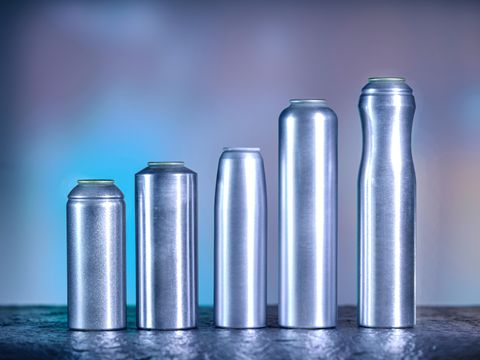
The International Organization of Aluminum Aerosol Container Manufacturers (AEROBAL) reports that, in the first half of 2024, its members’ global deliveries rose by 4.4% to over 3.4 billion units – yet access to aluminium recyclate is still limited, and global economic tensions continue to pose challenges.
Deliveries to Europe and South and North America were said to be the predominant drivers behind the market growth, increasing by around 5% and 11%, respectively. Deliveries to Asia/Oceania increased by around 3%, and the Middle East by about 17% – yet deliveries to Africa apparently fell by about 3%.
Demand for deodorants and hairsprays is said to have driven market growth, with the sectors undergoing respective increases of 7% and 8%. Demand from the pharmaceutical sector is said to have grown by around 3%.
Meanwhile, the ‘less significant’ food sector was still said to have experienced an increase in demand as high as 12%.
AEROBAL describes carbon reduction as a ‘key focus’ in the packaging industry, citing this interest as the reason for increased interest in ‘green aluminium’ – aluminium produced using renewable energy and therefore offering a lower CO2 footprint. This focus has also resulted in a ‘lively demand’ for aluminium cans with high post-consumer recycled content; however, high-quality aluminium scrap is in limited supply.
Design for Recycling guidelines are highlighted as being ‘of central importance’ to the industry, as they are expected to help aluminium aerosol cans re-enter the recycling loop with minimal packaging complexity and material use.
“The current draft of a new European packaging regulation already includes requirements for consistent design for recycling, which still need to be further specified by delegated acts from the EU Commission,” explains Seifeldin Raslan Mohamed, secretary general at AEROBAL. “A consortium of packaging associations is currently working with the Cyclos HTP Institute on a study to develop specific design for recycling criteria and guidelines for various aluminum packaging types.
“This document is intended to serve as a scientifically sound basis for upcoming discussions with relevant European standardization and legislative bodies.”
Despite increasing deliveries, though, weak economic conditions in most areas of the world, multiple crisis hotspots, and high inflation rates are thought to be ‘dampening the mood’ in the aluminium aerosol can industry.
“This unsatisfactory mix of economic and political challenges is creating headwinds that are slowing growth for both our member companies and customers,” adds AEROBAL president Rob Huffman. “But overall, the aluminum aerosol can industry is resilient, so we still expect demand to remain consistent or even see slight growth in the second half of the year. The medium-term outlook for aluminum aerosol cans remains quite positive as well.”
The news comes after AEROBAL reported a 6% increase in its members’ global shipments throughout 2023, reaching approximately 6.4 billion units overall. Approximately 83% of those deliveries were linked to the personal care market, whereas around 1% came from the pharmaceutical sector.
Meanwhile, as tube and aerosol can deliveries to Germany rose by 4% and 0.5% between 2022 and 2023, Aluminium Deutschland was ‘cautiously optimistic’ that the German aluminium industry would progress in 2024. It has since reported that all sub-sectors experienced declines in production in the first quarter, which has been linked to high energy costs and third-country imports.
If you liked this story, you might also enjoy:
The ultimate guide to the Packaging and Packaging Waste Regulation in 2024
How are the top brands progressing on packaging sustainability?
Sustainable Innovation Report 2024: Current trends and future priorities
Everything you need to know about global plastic sustainability regulation














No comments yet